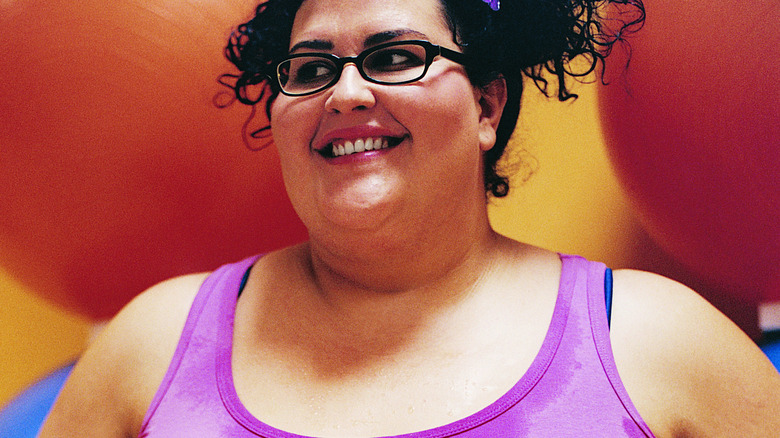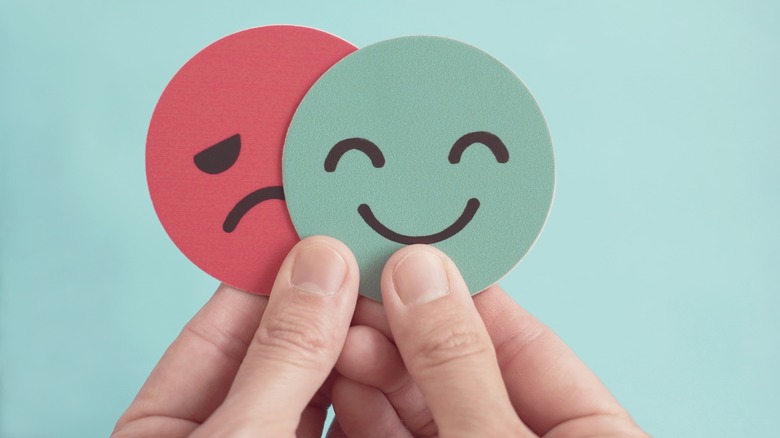How Body Neutrality Can Change Your Self-Image Mindset
Over the past few years, the body positivity movement has exploded on social media. This concept centers on loving and accepting your body as it is, flaws and all, per Forbes. Body positivity also focuses on improving one's body image for the better. By definition, body image is how you view your body and how you believe others view it. Needless to say, having a negative body image can be detrimental to both your physical and mental health. Although body positivity was originally seen as a solution for unrealistic expectations of how a body should or shouldn't look, there's a major downside to it too.
Health experts have pointed out that body positivity puts too much importance on beauty and doubles down on the notion that people are valued for what they look like above all else. Enter body neutrality, a term popularized by body image coach Anne Poirier back in 2015 (via The New York Times). Dietician Casey Bonano, R.D., elaborated to Shape: "Body neutrality is exactly what it sounds like: generally feeling neutral about your body most days. It means sometimes you feel positive about your body, you may have some negative thoughts, but often you may just not think about your body much at all."
As a result, it can be the major life change you need to stop obsessing over how you look all the time — especially if body positivity doesn't really speak to you.
It's not about loving your body
According to a study published in Frontiers in Psychiatry (via the National Library of Medicine), around 20% to 40% of women and 10% to 30% of men are unhappy with their bodies. Body neutrality aims to change how we think and feel about ourselves. However, unlike body positivity, it has little to do with looks. As Anne Poirier clarified to The New York Times: "Body neutrality prioritizes the body's function, and what the body can do, rather than its appearance." Thus, "You don't have to love or hate it. You can feel neutral towards it."
In other words, the essence of body neutrality is gratitude. It allows you to appreciate solely that your body is keeping you alive. Despite the fact that you may feel negative about your body, that doesn't mean you always have to be positive about it either. Instead, body neutrality encourages self-worth to be placed on who you are as a person rather than what you look like. This could help transform how you feel about yourself and your body image.
As dietician Maria Sorbara Mora, R.D., informed Shape: "Studies show that practicing gratitude supports positive mental health in both well-adjusted folks as well as those struggling with mental health issues." She added, "[This] suggests that practicing body neutrality can aid in better wellbeing for those who already appreciate their bodies as well as those who may struggle with body acceptance."
How to incorporate body neutrality into your life
If body neutrality appeals to you and is something you want to explore further, first try practicing mindfulness and gratitude toward your body. Instead of fixating on how your body looks, consider what it does for you and be thankful for it. In addition, body neutrality encourages you to listen to your body. If you don't feel up to doing something or are physically unable, be gentle with yourself. In fact, many experts actually prefer body neutrality over body positivity, especially when it comes to individuals who are recovering from or struggling with an eating disorder.
This is because body neutrality encourages self-acceptance above all else. Elizabeth Wassenaar, medical director of Eating Recovery Center, explained to Byrdie: "Body neutrality is a place to start to reverse the impact of internalizing the trauma of weight bias and stigma. Sometimes body positivity can feel 'fake' and body neutrality feels more authentic, which is so important when you are working on living authentically and joyfully in the body you have."
Likewise, psychologist Susan Albers, PsyD, told the Cleveland Clinic: "Body neutrality makes you dig deep and ask those questions about how you came to adopt and internalize the unrealistic beauty standards and ideals." She added that it also gives you the space to put your energy elsewhere, rather than wasting time feeling bad about something that, in the grand scheme of things, isn't even the most important or interesting thing about you.
If you need help with an eating disorder, or know someone who is, help is available. Visit the National Eating Disorders Association website or contact NEDA's Live Helpline at 1-800-931-2237. You can also receive 24/7 Crisis Support via text (send NEDA to 741-741).


